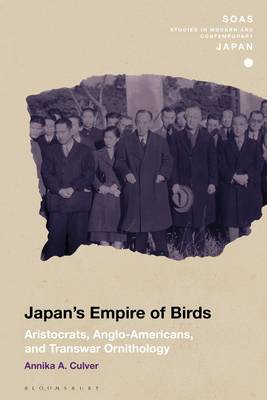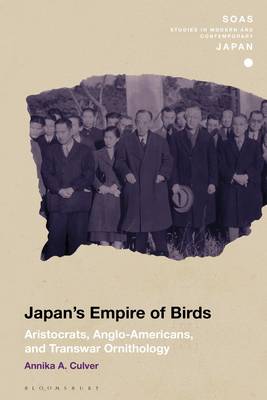
- Afhalen na 1 uur in een winkel met voorraad
- Gratis thuislevering in België vanaf € 30
- Ruim aanbod met 7 miljoen producten
- Afhalen na 1 uur in een winkel met voorraad
- Gratis thuislevering in België vanaf € 30
- Ruim aanbod met 7 miljoen producten
Zoeken
€ 220,45
+ 440 punten
Uitvoering
Omschrijving
As a transnational history of science, Japan's Empire of Birds: Aristocrats, Anglo-Americans, and Transwar Ornithologyfocuses on the political aspects of highly mobile Japanese explorer-scientists, or cosmopolitan gentlemen of science, circulating between Japanese and British/American spaces in the transwar period from the 1920s to 1950s.
Annika A. Culver examines a network of zoologists united by their practice of ornithology and aristocratic status. She goes on to explore issues of masculinity and race related to this amidst the backdrop of imperial Japan's interwar period of peaceful internationalism, the rise of fascism, the Japanese takeover of Manchuria, and war in China and the Pacific. Culver concludes by investigating how these scientists repurposed their aims during Japan's Allied Occupation and the Cold War. Inspired by geographer Doreen Massey, themes covered in the volume include social space and place in these specific locations and how identities transform to garner social capital and scientific credibility in transnational associations and travel for non-white scientists.
Annika A. Culver examines a network of zoologists united by their practice of ornithology and aristocratic status. She goes on to explore issues of masculinity and race related to this amidst the backdrop of imperial Japan's interwar period of peaceful internationalism, the rise of fascism, the Japanese takeover of Manchuria, and war in China and the Pacific. Culver concludes by investigating how these scientists repurposed their aims during Japan's Allied Occupation and the Cold War. Inspired by geographer Doreen Massey, themes covered in the volume include social space and place in these specific locations and how identities transform to garner social capital and scientific credibility in transnational associations and travel for non-white scientists.
Specificaties
Betrokkenen
- Auteur(s):
- Uitgeverij:
Inhoud
- Aantal bladzijden:
- 328
- Taal:
- Engels
- Reeks:
Eigenschappen
- Productcode (EAN):
- 9781350184930
- Verschijningsdatum:
- 21/04/2022
- Uitvoering:
- Hardcover
- Formaat:
- Genaaid
- Afmetingen:
- 156 mm x 234 mm
- Gewicht:
- 635 g

Alleen bij Standaard Boekhandel
+ 440 punten op je klantenkaart van Standaard Boekhandel
Beoordelingen
We publiceren alleen reviews die voldoen aan de voorwaarden voor reviews. Bekijk onze voorwaarden voor reviews.







